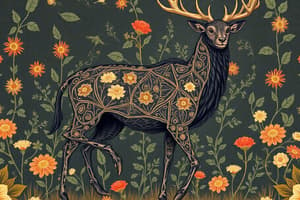Podcast
Questions and Answers
What does comparative physiology primarily study?
What does comparative physiology primarily study?
- Circulation mechanisms in reptiles.
- How variations in physiological processes arise in different animal groups. (correct)
- The processes of digestion in mammals.
- The effects of habitat destruction on animal populations.
Which of the following best defines population dynamics?
Which of the following best defines population dynamics?
- The study of food chains and food webs.
- The size and changes in animal populations over time. (correct)
- The interactions between different species in a community.
- The physical characteristics of an animal's habitat.
What is the role of natural selection in evolution?
What is the role of natural selection in evolution?
- To create genetic variations among species.
- To eliminate all organisms that do not adapt.
- To favor traits that enhance survival and reproduction. (correct)
- To replace old species with new ones continuously.
Which concept includes the flow of energy and nutrients within an environment?
Which concept includes the flow of energy and nutrients within an environment?
How do genetic mechanisms contribute to evolution?
How do genetic mechanisms contribute to evolution?
What is the primary focus of zoology?
What is the primary focus of zoology?
Which characteristic is NOT typical of animals?
Which characteristic is NOT typical of animals?
Which of the following phyla includes invertebrates as well as vertebrates?
Which of the following phyla includes invertebrates as well as vertebrates?
What is a characteristic feature of Arthropoda?
What is a characteristic feature of Arthropoda?
How do innate and learned components influence animal behavior?
How do innate and learned components influence animal behavior?
Why is it important to study animal behavior?
Why is it important to study animal behavior?
Which animal classification factor is primarily based on evolutionary history?
Which animal classification factor is primarily based on evolutionary history?
Which phylum is characterized by stinging cells used for defense?
Which phylum is characterized by stinging cells used for defense?
Flashcards
Animal Physiology
Animal Physiology
The study of how animals function, encompassing processes like respiration, circulation, digestion, and excretion.
Comparative Physiology
Comparative Physiology
Studies the differences in physiological processes across various animal groups, revealing how they adapt to diverse environments.
Animal Ecology
Animal Ecology
Examines how animals interact with their surroundings, including their roles in ecosystems and food webs.
Population Dynamics
Population Dynamics
Signup and view all the flashcards
Habitat
Habitat
Signup and view all the flashcards
What is Zoology?
What is Zoology?
Signup and view all the flashcards
What do Zoologists study?
What do Zoologists study?
Signup and view all the flashcards
What are the defining characteristics of animals?
What are the defining characteristics of animals?
Signup and view all the flashcards
How are animals classified?
How are animals classified?
Signup and view all the flashcards
What are Chordates?
What are Chordates?
Signup and view all the flashcards
What are Arthropods?
What are Arthropods?
Signup and view all the flashcards
What is animal behavior?
What is animal behavior?
Signup and view all the flashcards
Why is understanding animal behavior important for conservation?
Why is understanding animal behavior important for conservation?
Signup and view all the flashcards
Study Notes
General Characteristics of Zoology
- Zoology is the study of animals.
- It examines everything from individual animal anatomy and function to species interactions and environmental impact.
- Zoologists study animal behavior, evolution, physiology, genetics, and ecology.
Animal Classification
- Animals are eukaryotic, multicellular organisms.
- Key features include heterotrophic nutrition, movement (at some point in their life cycle), and specialized tissues.
- Traditional animal classification uses a hierarchical system (kingdom to species).
- Modern classification incorporates phylogenetic relationships (evolutionary history).
- Various classification systems exist, reflecting evolving knowledge and interpretations.
Major Animal Phyla
- The animal kingdom is divided into many phyla.
- Examples of major phyla include:
- Chordata (vertebrates and invertebrates with notochords): Characterized by a notochord, dorsal hollow nerve cord, pharyngeal slits, and post-anal tail. Includes vertebrates (fish, amphibians, reptiles, birds, mammals) and various invertebrate chordates.
- Arthropoda (insects, crustaceans, arachnids): Segmented bodies, jointed appendages, and exoskeletons. Largest phylum by species count.
- Mollusca (snails, clams, squid): Soft bodies often with shells, muscular foot, and mantle.
- Porifera (sponges): Porous bodies and filter-feeding.
- Cnidaria (jellyfish, corals, anemones): Stinging cells (nematocysts) for defense and capturing prey.
- Platyhelminthes (flatworms): Flattened bodies, bilateral symmetry, and often a simple digestive system.
Animal Behavior
- Animal behavior encompasses a wide range of actions, from reflexes to social interactions.
- Both innate and learned factors influence behavior.
- Studying animal behavior reveals aspects of adaptation, communication, and social organization.
- Examples include foraging (finding food), mating rituals, and predator-prey relationships.
- Behavioral studies are used for conservation strategies.
Animal Physiology
- Animal physiology describes bodily processes.
- Understanding how animals function is crucial.
- Physiology encompasses various processes like respiration, circulation, digestion, and excretion.
- Physiological mechanisms differ greatly between animals.
- Comparative physiology examines differences in physiological processes across species.
Animal Ecology
- Animal ecology studies animal-environment interactions.
- It involves understanding animal roles in ecosystems and food webs.
- Key ecological concepts include:
- Population dynamics (change in population size).
- Community ecology (interactions between species).
- Ecosystem dynamics (energy and nutrient flow).
- Habitat (animal's physical environment).
- Ecological research helps understand how environmental changes affect animal populations.
Animal Evolution
- Species change (evolve) over time.
- Evolutionary principles explain the variety of animal forms.
- Natural selection drives the inheritance of survival-enhancing traits.
- Genetic mechanisms and environmental factors shape evolution.
- The fossil record provides insights into evolutionary history.
- Understanding animal evolution clarifies relationships between different groups.
Studying That Suits You
Use AI to generate personalized quizzes and flashcards to suit your learning preferences.




